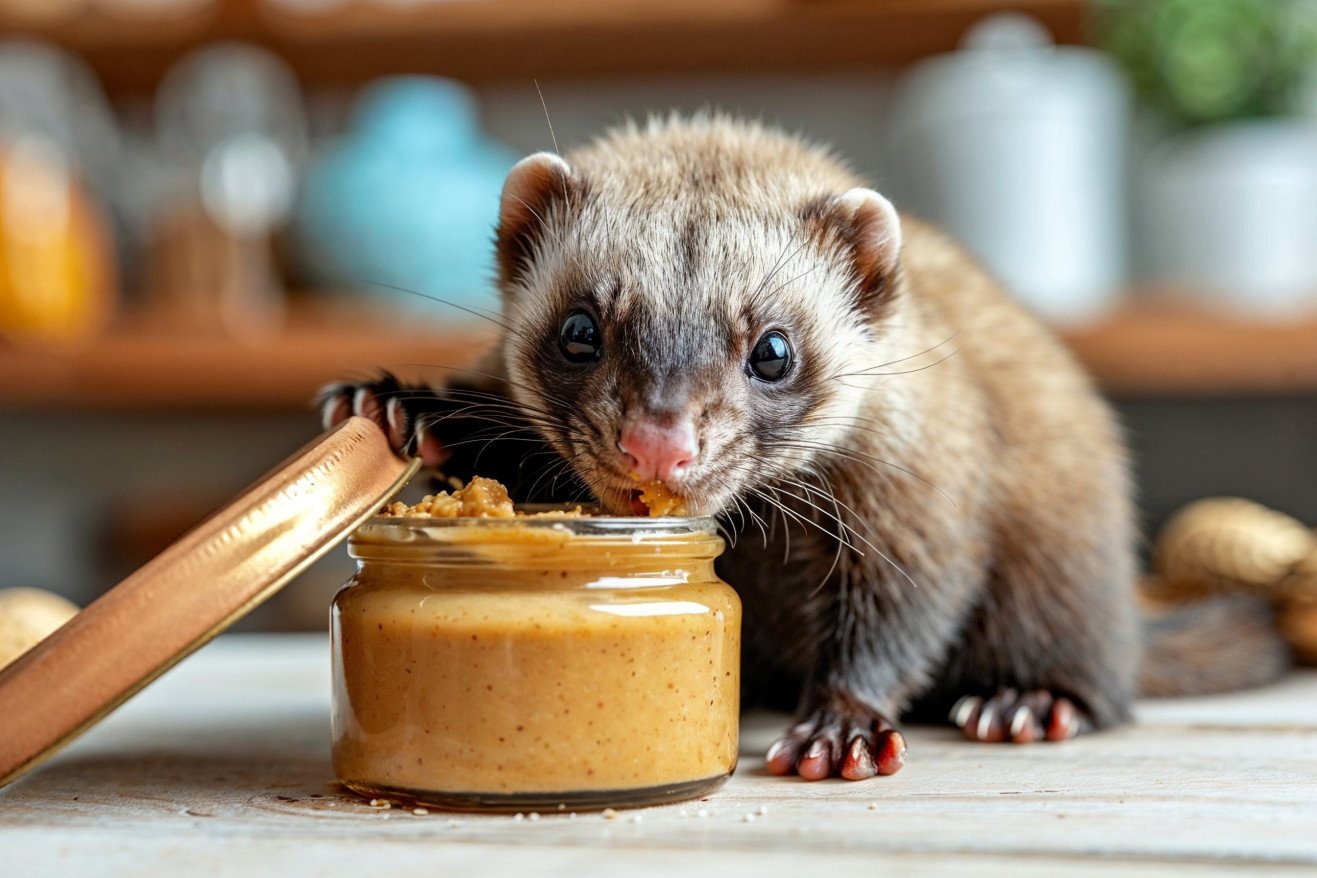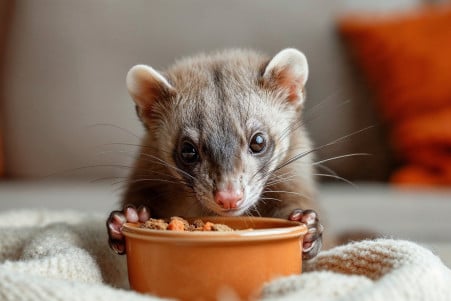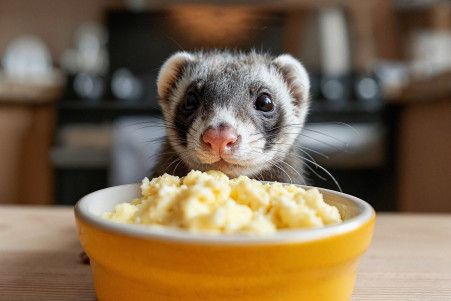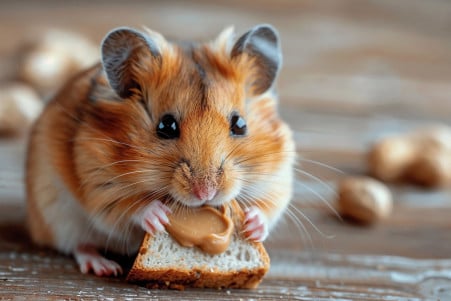Can Ferrets Have Peanut Butter? Nutritional Facts Explained
20 January 2024 • Updated 28 January 2024

Peanut butter is a common household item, but can it be a snack for your ferret? No, ferrets cannot have peanut butter. Since ferrets are obligate carnivores, their diet needs to be rich in animal proteins. The carbs and sugars in peanut butter can lead to digestive and other health problems. Instead, use ferret-formulated or high-quality kitten food to meet their nutritional requirements.
This article will help you learn why peanut butter is not a good option for your ferret by delving into studies that have investigated the nutritional needs of ferrets and the dangers of feeding them non-meat foods. It will also cover research on ferret metabolism and gut health and the effects of the components found in peanut butter on ferrets.
This information will give you a better understanding of what your ferret should be eating and how to make sure they are as healthy and happy as possible.
Can ferrets eat peanut butter?
Ferrets Are Obligate Carnivores: Here’s What That Means
As obligate carnivores, ferrets need a diet that is high in animal proteins and fats. According to PubMed, their short digestive system, which is shorter than that of other domesticated animals, is adapted to absorb these nutrients. This is because their digestive system is not designed to absorb nutrients from plant-based foods, like the complex carbohydrates and fiber in peanut butter.
The best diet for ferrets is one that is made up of animal proteins and fats, which is consistent with the diet of their prey in the wild. As the ScienceDirect study notes, ferrets need a nutrient-dense diet that is low in fiber and high in protein and fat to maximize the energy they get from their food.
As a result, ferrets should be fed a diet of specially formulated ferret food or high-quality kitten food, both of which should contain less than 30% carbohydrates and at least 30% animal protein, according to PubMed.
Feeding ferrets plant-based foods, especially those like peanut butter that are high in sugar, can lead to health problems because their digestive system is not designed to absorb these foods. This is why the fact that ferrets are obligate carnivores is so important. It also shows why it’s important to feed ferrets a diet of ferret-specific or high-quality kitten food, which is the only way to ensure that they get the nutrients they need.
Ferret Digestion 101
Ferrets have a very simple digestive system, with a short intestinal tract and a fast transit time, according to a study in PMC. This simple anatomy is highly adapted to the animal proteins and fats that ferrets eat, and it ensures that ferrets can get the most out of the nutrients in their carnivorous diet.
However, because their digestive system is so simple, ferrets don’t have the ability to break down complex carbs and fibers, which are found in peanut butter.
This can cause a number of problems for ferrets. Not only do carbs and sugars found in foods like peanut butter not meet their dietary needs, but they can also lead to digestive issues and other health problems.
This is because ferrets aren’t adapted to eat foods like peanut butter, and eating them can lead to short-term digestive problems and long-term health issues, according to research in ScienceDirect. Because ferrets need a diet that’s high in energy and easy to digest, it’s especially important that they stick to a diet that’s high in animal protein.
Why Peanut Butter Is Bad for Ferrets
While peanut butter may seem like a harmless snack, it contains sugars and sometimes xylitol, both of which are toxic to ferrets. A-Z Animals explains that sugars can lead to insulinoma, a condition that causes tumors to form in the pancreas and results in low blood sugar. Meanwhile, xylitol, an artificial sweetener found in many sugar-free products, can be fatal, leading to seizures, hypoglycemia, and liver failure.
Ferrets that eat foods that are not part of their normal diet as obligate carnivores can experience allergic reactions or toxicities. The RSPCA lists signs of poisoning to look out for, including vomiting, diarrhea, lethargy, seizures, and weakness in the back legs.
Owners should take their ferrets to the vet immediately if they accidentally eat peanut butter or any other toxic food. The American Ferret Association urges owners to be careful and avoid feeding their ferrets these types of foods to prevent these health issues.
This is especially important because ferrets can’t digest the complex carbohydrates and fibers found in many non-meat foods. It’s important that owners make sure that their ferrets stick to a strict carnivorous diet for their health, which we’ll go into more detail about in terms of their metabolic requirements and ability to absorb nutrients.
Ferret Metabolism: Designed for a Carnivorous Diet
The fast metabolism of ferrets is a sign that they require a diet that is high in animal proteins and fats. As noted in the Journal of Mammalogy, ferrets, along with other mustelids, don’t have a metabolic rate that is significantly different from what would be expected for mammals of their size, which means that their metabolic needs are well-matched to their diet.
This is why eating plant-based foods like peanut butter throws off ferrets’ metabolism, because it doesn’t meet their natural dietary needs.
The study also shows that ferrets are not very good at converting beta-carotene to vitamin A, which is a process that is typically more efficient in animals that eat a more varied diet that includes plant-based foods.
This means that ferrets’ ability to absorb nutrients from animal-based foods is much better than their ability to absorb nutrients from plant-based foods, which is important for their health.
Ferrets’ digestive systems are not well-equipped to handle the complex carbohydrates and fibers found in peanut butter, which can lead to health problems in the long run. This means that it’s important for ferret owners to understand the ins and outs of ferret metabolism so that they can make the best choices for their pets’ diets and make sure that they’re getting the nutrients that they need to be healthy and thrive.
Peanut Butter Ingredients and Ferret Health: A Toxicological Examination
Some molds that grow on agricultural products like peanuts can produce aflatoxins, which can be found in peanut butter.
One article cited in PubMed looked at the impact on ferrets that were fed the muscle and liver tissues of chickens that had been fed aflatoxin-contaminated peanut meal. The study found no histopathological changes in the ferret tissues.
However, this doesn’t mean that there aren’t any long-term effects of aflatoxins, which are known to be carcinogenic. While the metabolism of aflatoxins in ferrets hasn’t been well-studied, one article in PMC that looked at another species found that animals metabolize most aflatoxins, suggesting that more research is needed on ferrets.
In addition, xylitol, an artificial sweetener that’s found in some peanut butter products, is toxic to ferrets, causing hypoglycemia and liver failure, according to Sugar Land Veterinary Specialists. Meanwhile, if ferrets consume too much salt, another common ingredient, it can result in sodium ion toxicosis. Knowing about these toxicological effects is important for ferret owners to prevent their pets from experiencing long-term health problems.
So, Can Ferrets Eat Peanut Butter?
So, after all of that, it should be pretty clear that ferrets need a diet that is high in animal protein and fat.
And, after all of that, it should also be pretty clear that peanut butter, with its high sugar and carbohydrate content, is not only not good for ferrets but can actually be harmful to them. We’ve gone over how the ingredients in peanut butter, including sugar, xylitol, and even possibly aflatoxins, can cause everything from an upset stomach to a toxic reaction in ferrets.
Ferret owners need to be aware of the risks and make sure to feed their pets a diet that is appropriate for their carnivorous nature and not give in to the temptation to share their own snacks.
Ferrets’ unique digestive and metabolic systems mean that they need to be fed a very specific diet to avoid the dangers of feeding them the wrong foods. By feeding them a diet of specially formulated ferret food or high-quality kitten food, owners can make sure that their pets get the nutrition that they need to be healthy.
So, in the end, it’s clear that feeding ferrets a proper diet is not just a suggestion, it’s a requirement. Making sure that these playful and inquisitive animals get the right nutrition is a key part of being a good ferret owner and is essential to their overall health.


